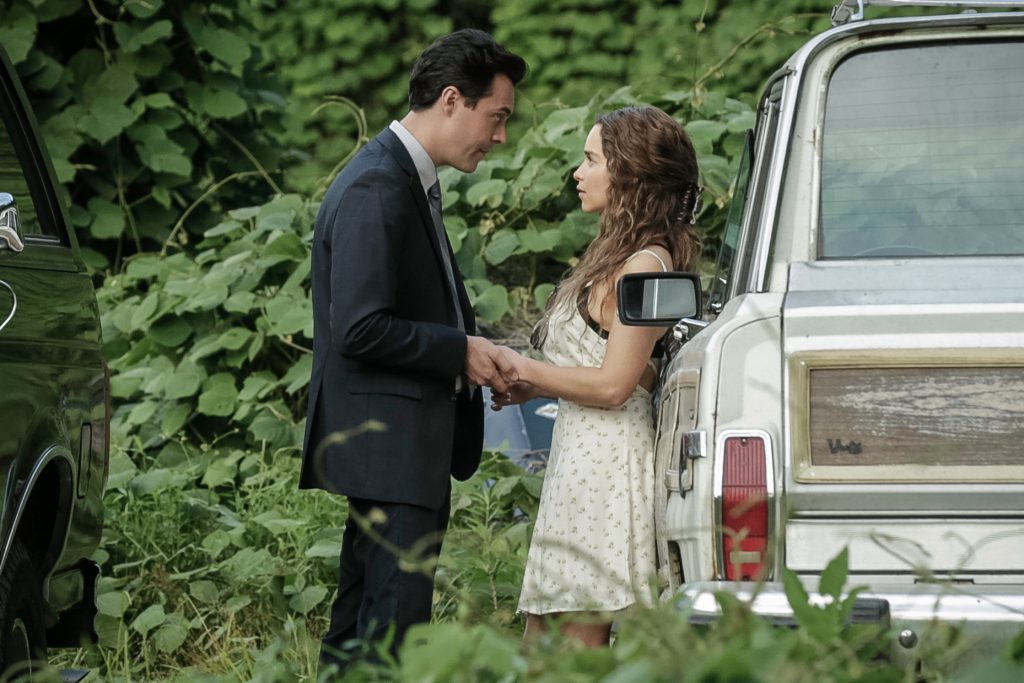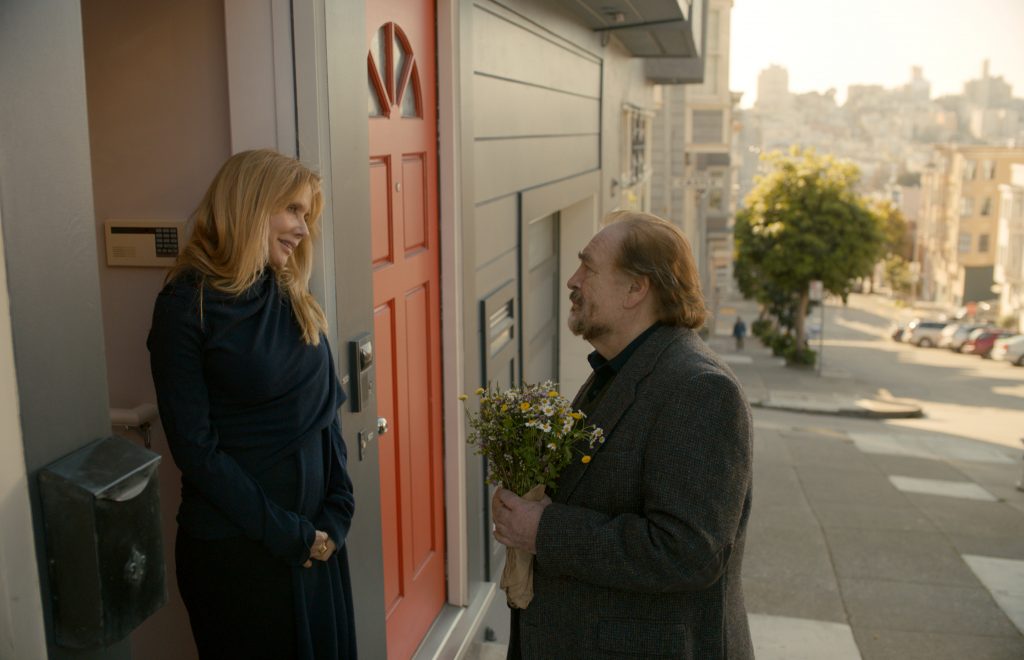May 30, 2021
by Carla Hay

Directed by Phillip Noyce
Culture Representation: Taking place in Kentucky from 1988 to 1989, the crime drama “Above Suspicion” features a predominantly white cast of characters (with a few African Americans) representing the working-class, middle-class and criminal underground.
Culture Clash: A drug-addicted woman becomes a confidential informant to the FBI, and complications ensue when she gets emotionally involved with the FBI agent who is her contact.
Culture Audience: “Above Suspicion” will appeal mostly to people who don’t mind watching predictable and pulpy crime movies that put more emphasis on being tacky than being suspenseful.

The cheap-looking and tawdry drama “Above Suspicion” is based on a true crime story, but the movie foolishly gives away the ending at the very beginning of the film. In other words, if viewers don’t know what happened in this case in real life, they’ll know exactly what the outcome is in the movie’s opening scene, which has a morbid “voice from the dead” narration from the movie’s main character. “Above Suspicion” just goes downhill from there.
Directed by Phillip Noyce, “Above Suspicion” is one of those “flashback” movies where the narrator is telling what happened in the past. And in this movie (which takes place in 1988 and 1989), the narrator tells viewers that she’s already dead. Her name is Susan Smith (played by Emilia Clarke), a divorced mother of two children. She was in her late 20s when she died.
In these flashbacks of her life, Susan is a cocaine-snorting, pill-popping, marijuana-smoking ne’er do well who makes money by committing fraud. She’s been collecting government welfare checks from the state of West Virginia, which she’s not entitled to have because she actually lives in Kentucky, where she gets welfare checks too. And occasionally, Susan sells drugs to make money.
In the movie’s opening scene, Susan says in a voiceover: “You know what’s the worst thing about being dead? You get too much time to think. Thinking is painful. Knowing things is painful.”
To serve as a warning to viewers, a better way to open this movie would have been: “You know what’s the worst thing about a brain-dead movie? It wastes too much time. Watching it is painful. Knowing this movie could be so much better is painful.”
And sitting through all the cringeworthy lines that stink up this movie is painful. Chris Gerolmo wrote the “Above Suspicion” screenplay, which is based on journalist Joe Sharkey’s 1993 non-fiction book of the same name. People who’ve read that book will probably find this movie difficult to watch because it takes what was fascinating about this true crime book and turns it into a trashy melodrama.
Clarke, who is British in real life, attempts to give a believable and edgy performance as a Kentucky mother who’s lost her way in life and ends up falling for and clinging to a seemingly straight-laced married FBI agent. But there are moments when Clarke’s true British mannerisms come through, such as when she slips up and says the word “whilst” instead of “while” during one of the many scenes where her Susan character is yelling at someone. “Whilst” is not the kind of word that would be in the vocabulary of a Kentucky hillbilly like Susan.
Because “Above Suspicion” reveals in the opening scene that Susan is dead, the rest of this 104-minute movie is really just a countdown to Susan’s death. Given the lifestyle that she leads and what’s at stake when Susan gets involved with a married FBI agent with a squeaky-clean reputation, it’s not hard to figure out how she’ll die. And it won’t be from a drug overdose. If viewers don’t know what happened to the real Susan Smith in this case before they see “Above Suspicion,” it’ll become pretty obvious what her fate will be soon after this movie begins.
Susan lives in a dirty and disheveled house in Pikeville, Kentucky, with her sleazy ex-husband Cash (played by Johnny Knoxville), who’s a small-time drug dealer. They’re still living together because they can’t afford to get their own separate places. (In real life, the name of Susan’s ex-husband was Kenneth, but he really was a drug dealer.) Susan and Cash’s two children—an unnamed daughter who’s 7 or 8 years old (played by Lex Kelli) and a son named Isom who’s 5 or 6 years old (played by Landon Durrance)—don’t say much, probably because they’re shell-shocked by living in such a dysfunctional home.
Someone who does talk a lot is Susan. She and Cash have arguments and physical fights with each other, and she gets irritable or impatient with almost anyone who crosses her path, except for her children. Two other people who live in Susan and Cash’s dumpy house are an unemployed couple in their 20s: Joe B. (played by Karl Glusman) and his girlfriend Georgia Beale (played by Brittany O’Grady), who don’t seem to do much but sleep all day. Joe met Cash when they were in prison together. Cash is the one who invited Joe to stay at the house after Joe got out of prison. Needless to say, Susan isn’t very happy about it.
In one of the movie’s early scenes, Joe makes inappropriate sexual comments to Susan, who understandably gets upset. Joe also calls her “Susie,” which she hates. But then, Susan also takes her anger out on Georgia about it. Susan bursts into the room where Georgia is sleeping and berates her about Joe being a creep. As Susan storms back out of the room, she screams at Georgia, “Pay me my rent money, bitch!”
Joe actually has been making money, but in an illegal way. He’s secretly a bank robber who has been targeting banks in cities near Pikeville, with Georgia’s help as his occasional getaway driver. Susan knows this secret because Joe’s red Chevy pickup truck fits the news media’s description of the getaway car. And she’s found Joe’s stash of cash with the guns that were used in the robberies.
“Above Suspicion” has some druggie party scenes that are exactly what people might expect. And it’s only a matter of time before fights break out at these parties. Susan’s volatile younger brother Bones (played by Luke Spencer Roberts) predictably gets in one of these fights, which leads to a particularly violent scene that was fabricated for this movie, just to add more melodrama.
Susan says in a voiceover: “Welcome to Pikeville, the town that never lets go.” She also says that in Pikeville, which is plagued by drug addiction, there are two main ways that people make money: “the funeral business or selling drugs.” And earlier in the film, this is how Susan describes herself: “I was a regular girl once. But things go wrong, as things will.”
Susan’s life takes a fateful turn when she meets Mark Putnam (played by Jack Huston), an ambitious and fairly new FBI agent, who has transferred to Pikeville to investigate the bank robberies. When Susan first sees Mark, who’s two years older than she is, she describes him like a hunk straight out of a romance novel. It’s lust at first sight for Susan.
And when Susan finds out that Mark is the FBI agent leading the investigation into the robberies, she sees it as an opportunity to get to know him better. It isn’t long before she drops hints to Mark that she knows who the bank robber is, but she’s afraid to be exposed as a snitch. Mark offers to pay Susan for bits and pieces of information, and she becomes his main confidential informant.
Susan dangles enough tips for Mark to investigate to keep him coming back for more. There’s an ulterior motive, of course. Susan wants to seduce Mark. And because Mark is so different from the men she’s used to being involved with, Susan starts to fall in love with him. However, it’s debatable whether it’s true love or if it’s Susan just wanting a ticket out of her dead-end life. At one point, when Mark asks Susan what she wants most in her life, she answers, “Rehab and money.”
Susan knows that Mark is happily married and has a baby daughter with his wife Kathy Putnam (played by Sophie Lowe), but that doesn’t seem to deter Susan from having a fantasy that Mark will eventually leave Kathy to be with Susan. When Susan and Mark meet in out-of-the-way and deserted places in other Kentucky cities such as Portersville and Martin, it’s just like the clandestine way that secret lovers meet. Susan starts to tell Mark that they both make a great team, but she wants to make their “partnership” about more than FBI work.
“Above Suspicion” portrays Susan as toning down some of her vulgar and mean-spirited ways to try to seduce Mark. She gives him a lot of flattery and attention. And anyone watching this movie will not be surprised when Mark starts to fall for Susan too because he’s become slightly bored with his marriage. But Mark doesn’t feel so strongly about Susan that he wants to leave his wife. Mark has a big ego, and he enjoys being with someone who fuels that ego. Huston’s portrayal of Mark is as someone whose top priority in life is being the best at his job and getting recognition and praise for it.
Even if Mark were an available bachelor, Mark and Susan’s relationship has too many other issues, including a power imbalance and a difference in their social classes. And most troubling of all for Mark’s career is that getting sexually involved with Susan is a breach of ethics and an automatic compromise of the evidence that Mark is getting from her for this investigation. And once the investigation is over, where does Susan fit into Mark’s life?
Clarke and Huston (who is also British in real life) aren’t terrible in their roles, but they are hindered by a subpar screenplay. Huston’s Mark character is often written as two-dimensional, while Clarke’s Susan character displays over-the-top trashiness that becomes increasingly annoying, especially when Susan begins stalking Mark and his wife Kathy. It’s supposed to make Susan look emotionally needy, lovesick and vulnerable, but her obsession with Mark only makes her look mentally unhinged. As for Knoxville, his abusive Cash character is just another version of the scumbags that Knoxville usually portrays in movies.
There are some supporting characters in the movie that don’t add much to the story. Susan has a concerned older sister named Jolene (played by Thora Birch), who lives in West Virginia and occasionally calls Susan. Mark has a colleague named Todd Eason (played by Chris Mulkey), who’s retiring from the FBI in six months. There are an informant named Denver Rhodes (played by Omar Benson Miller) and an international drug dealer named Rufus (played by Brian Lee Franklin), who both appear in the last third of the movie.
Noyce’s direction of “Above Suspicion” aims for the movie to be gritty noir, but it’s really just low-budget junk. It’s very easy to predict how this story is going to end. And until that ending, which Susan already blabbed about in the voiceover narration, it’s just one scene after another of contrasting Susan’s riff-raff life with Mark’s law-enforcement life. These two worlds end up crashing in the most horrific of ways. And it’s too bad that the overall result is that “Above Suspicion” is a cinematic train wreck.
Lionsgate released “Above Suspicion” in select U.S. cinemas, on digital and VOD on May 14, 2021. The movie was released on Blu-ray and DVD on May 18, 2021.


